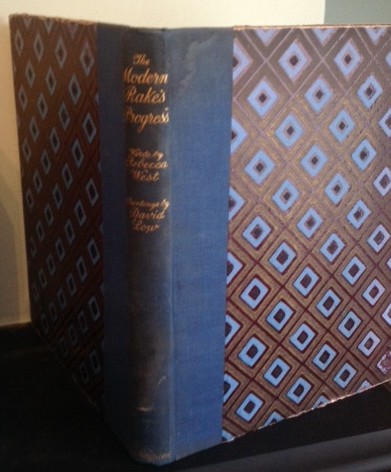Inspiring Older Readers
 posted on 15 Oct 2017
posted on 15 Oct 2017
The Modern Rake’s Progress by Rebecca West and illustrated by David Low
Published in 1934 this slender satirical tale from Rebecca West was turned into an expensive coffee-table publication by the addition of a dozen superb double page illustrations by satirical New Zealand born cartoonist, David Low. This partnership isn’t one which looks immediately like an obvious association and, it seems, West wasn’t at all convinced the project was a brilliant idea. In the end her reservations may have been well founded because her little story of the corrupting power of money and fame, of poverty and social inequality really does end up taking second place to Low’s drawings.

West has used William Hogarth’s morality tale, The Rakes’s Progress, to satirise her own times. Hogarth’s original work tells the story of the rise and fall of an ordinary 18th century man given the gift of wealth and fame who is then brought crashing back to earth as he inevitably over-reaches himself. West follows suit and it’s probably worth noting that she wasn’t the only commentator at this time seeing parallels between the foibles of 18th century Britain and the equally hedonistic and morally ambiguous 1930s.

We are introduced to George as he wakes up one morning to find himself unexpectedly a millionaire and a peer and we then get a series of set piece episodes that chart his social rise and his inevitable fall. So we see him throw a cocktail party, begin investing in dubious movie ventures, getting drawn into the world of boxing promotion, horse racing and gambling. He gets married and sees the marriage turn quickly to divorce until, at the end of his tether he loses all his money and is throw out onto the streets.

It is on the street that West wants him to be because, she observes, George is now perfectly placed to explain to the poor and the unemployed that they shouldn’t moan about their position. In a passage fizzing with sarcasm she writes:
You are in a perfect position to explain to them that they misconceive their lot, that they are not castaways, suffering by accident, in want simply because no one has taken thought to make provision for them. Tell them that there is a plan, which like everything else in this best of all possible worlds, is all for the best. Explain to them that they are the foundation stones on which civilisation is built, and even if the superstructure weighs heavy it is so fair that they should think it a privilege to bear the weight. You know all about the superstructure, George. Tell them how very fair it is.

There’s nothing too subtle here and, of course, in pre-second world war Britain this would have had resonance with the political rhetoric of the Labour, Socialist and Communist parties that were enjoying unprecedented popularity at this time.
But in truth you’ll want this book for David Low’s illustrations which are richly coloured, packed full of detail and fabulously evocative of the age. He’s brilliant in capturing the rapacious, greedy and exploitative and can conjure-up a vacuous upper-class face with ease. Low’s stock in trade was cartoons for the daily newspapers rather contempory satirists like Steadman or Rowson today. Just as they have found, Low clearly revelled in having the luxury of producing more lavish, thoughtful illustrations spread throughout a book rather than having to cram everything into a single topical cartoon.

Remarkably, the book isn’t rare and you’ll find plenty of copies still available on the second hand market. Even more remarkably, you’ll get a copy for less than £20.
Terry Potter
October 2017
